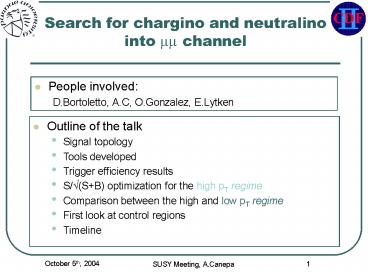Search for chargino and neutralino into channel - PowerPoint PPT Presentation
1 / 17
Title:
Search for chargino and neutralino into channel
Description:
S/(S B) optimization for the high pT regime. Comparison between the high and ... ID Eff (see Else's talk at JP and CDF note 7197) Just a list of currents ID ... – PowerPoint PPT presentation
Number of Views:22
Avg rating:3.0/5.0
Title: Search for chargino and neutralino into channel
1
Search for chargino and neutralino into ?? channel
- People involved
- D.Bortoletto, A.C, O.Gonzalez, E.Lytken
- Outline of the talk
- Signal topology
- Tools developed
- Trigger efficiency results
- S/v(SB) optimization for the high pT regime
- Comparison between the high and low pT regime
- First look at control regions
- Timeline
2
Event topology
- Signal point from CDFNote 6968
- 2 possible choices high and low pt (explain .
) - For high pt the ID and the trigger eff are
understood (corresponds to sample..) - For the low pt the ID and the trigger eff have to
be studied (corresponds to sample)
PLOTS sugrascan plot
3
Developing the toolsfor low pT regime
- ID Eff (see Elses talk at JP and CDF note 7197)
Just a list of currents ID - Trigger efficiency (CDF note 7196)
- Trigger of interest
- Method
- Bias removal
- Muon selection
- Trigger efficiency measurement
PLOTS pt distributions before and after bias
removal
4
Efficiency of L1 triggers
- Stub and track efficiency for L1 cmu1.5 and cmup6
(quote n. only) - L1 efficiency for cmu1.5 and cmup6
- comparison with high pt or B group for
consistency - Turn on at 4 Gev - 50 efficiency
- Plateau at 5 GeV as low as 5 GeV to gain in
acceptance
PLOTS L1 eff vs pt for both triggers vs eta
Asymm in eta same as high pt time dependance
? Do we show eff vs isolation?
5
Efficiency of Single Muon path
- Path cmu4 for both L1 cmu1.5 and L1 cmup6
- Comparison with high pt for consistency
- Value suitable to dilepton trigger efficiency
(both dimuon triggers and mixed triggers CEM4)
PLOTS efficiency vs pt for cmu4/cmu1.5 and for
cmu4/cmup6
6
Summary of trigger efficiencies
Tools ready for mu-mu (and e-mu) channel at low
pt?
7
Dimuon seach strategy
- Focuse on high pT scenario
- Require one high pT muon and one low pT muon
(20,4 GeV) - Remove J/?, ? and Z
- MET gt 15 GeV
- Require third muon
As for now, third muon is a tight muon Loose muon
ID defined after fake rate optmization Extension
to electron performed next
8
Geometrical distribution of muons
- DeltaPhi between muons
- DeltaR between muons
- Isolation vs pt
9
Missing energy content
- DeltaPhi between met and muon (max and min)
- DeltaPhi between met and muon (leading - non
leading) - Met vs pt of leading non leading muon
10
In case we do not veto jets
- DeltaPhi between jet and met
? Do we need it
11
Standard model backgrounds for the mm channel
- Backgrounds which are included in the estimation
of - S/v(SB)
- Diboson (WW,WZ,WW)
- Heavy flavour (t-tbar, b-bbar, c-cbar)
- Drell Yan
- Z decaying into mumu, into tautau
- W decaying into mu
- Wjets (W into muBB, muCC, mu1p)
12
S/v(SB)
- InvMass (J/?, ? and Z )
- Met gt 15 GeV
- DeltaPhi between muons gt 140
PLOTS signal over background for the 3 variables
13
Comparison between high and low pT
14
First look at control regions
- Should identify several control regions according
to the dominant background - Low met (metlt 15 GeV)
- Veto leptons
- DeltaR between muons lt 0.4 rad
- DeltaPhi between muons lt 140
- Min DeltaPhi between met and muon gt 140
15
Control region (I)
PLOTS invariant mass, DeltaR, both deltaPhi
- Low met
- Dominant background ?
- Veto leptons
- Dominant background ?
PLOTS met
16
Control region (II)
- Geometrical requirements
- Dominant background ?
PLOTS invariant mass and met for the 3 control
regions
17
Timeline
- We aim to have results for the winter conferences
- TO DO
- Cuts optimization
- ID for loose muon
- Fake rate
- Control region data-mc































